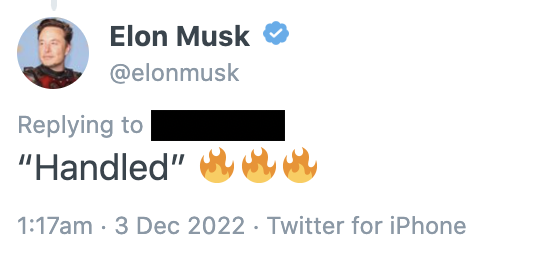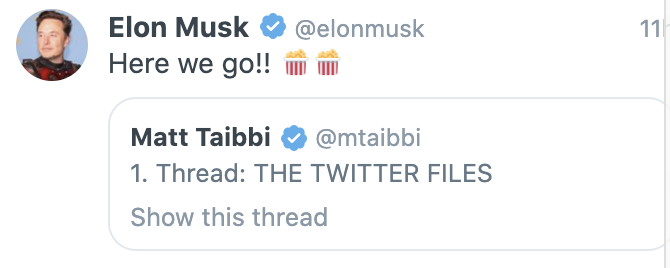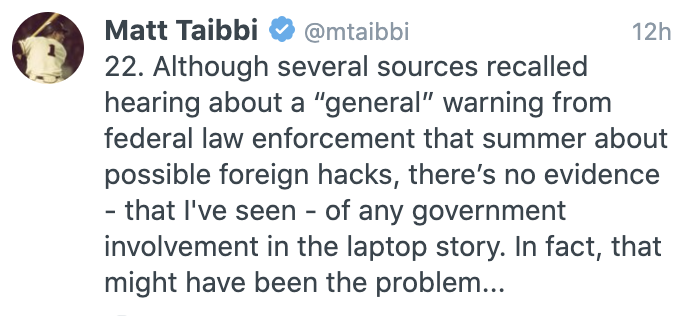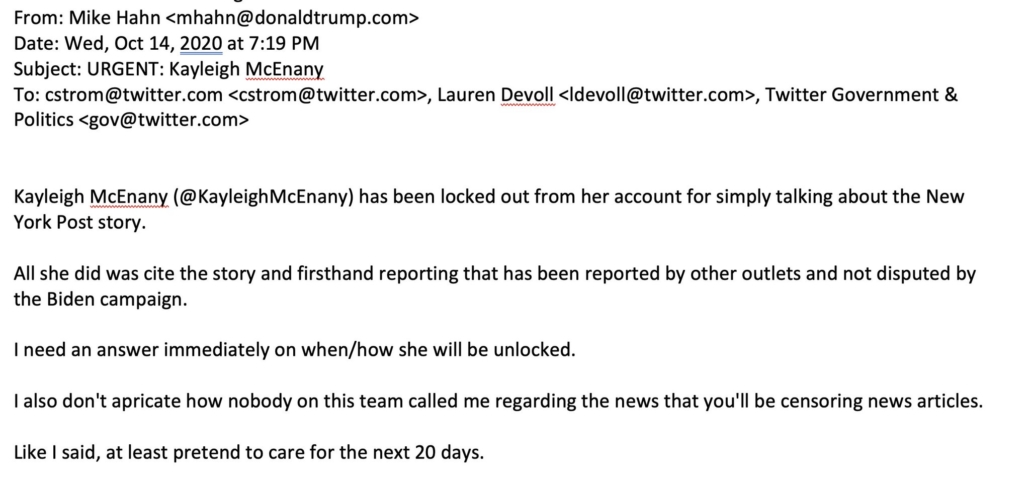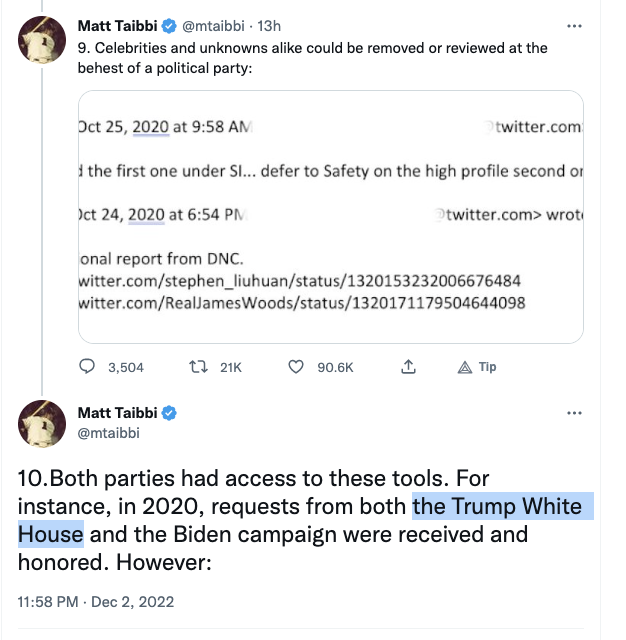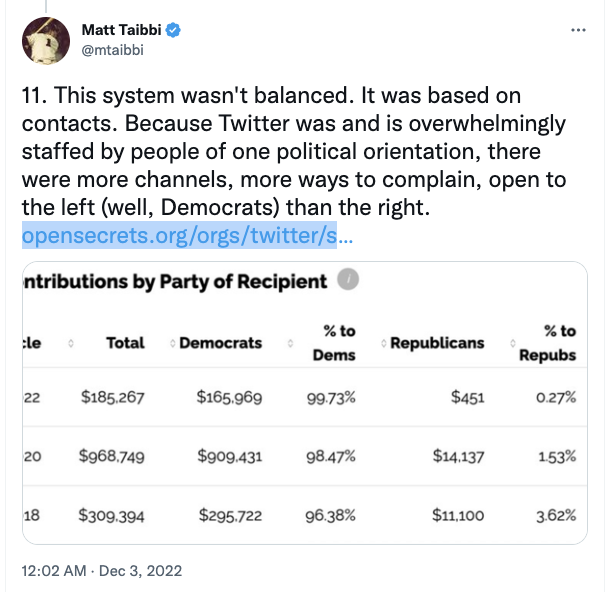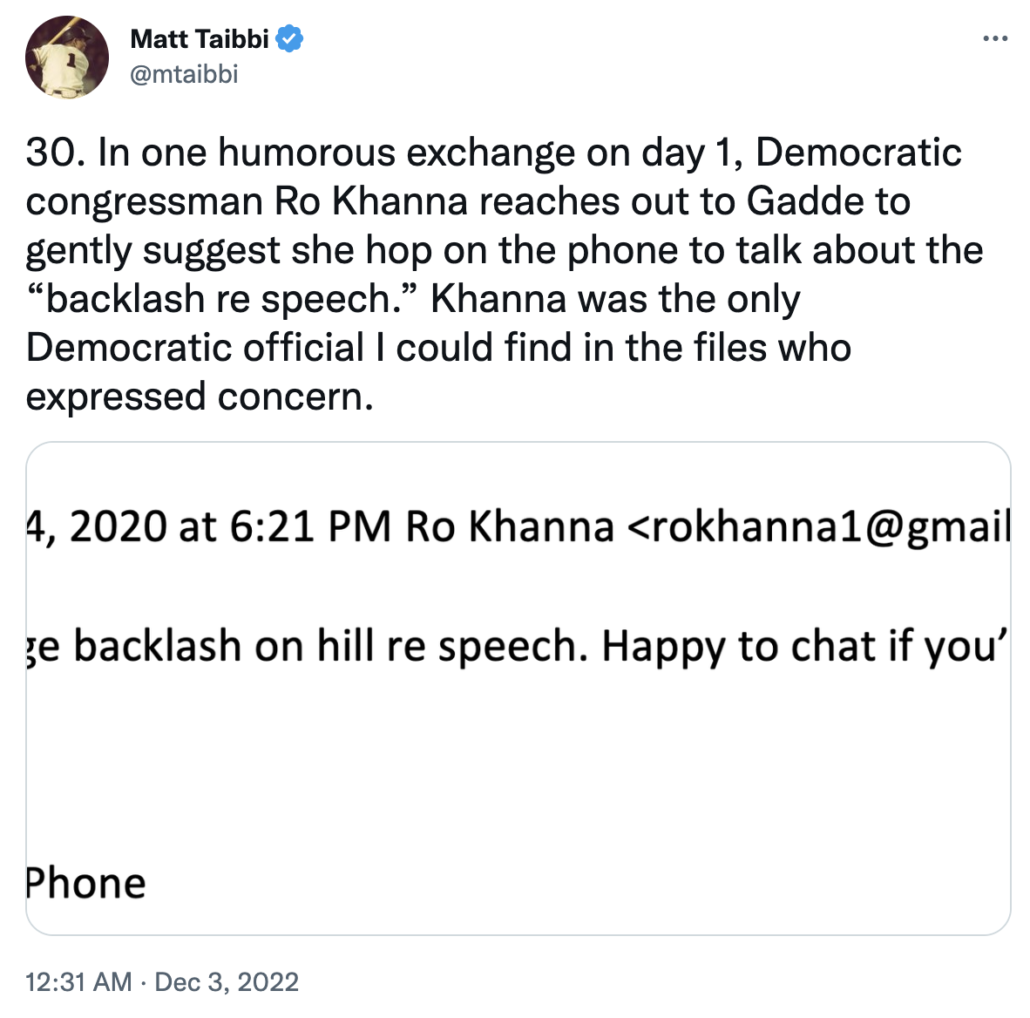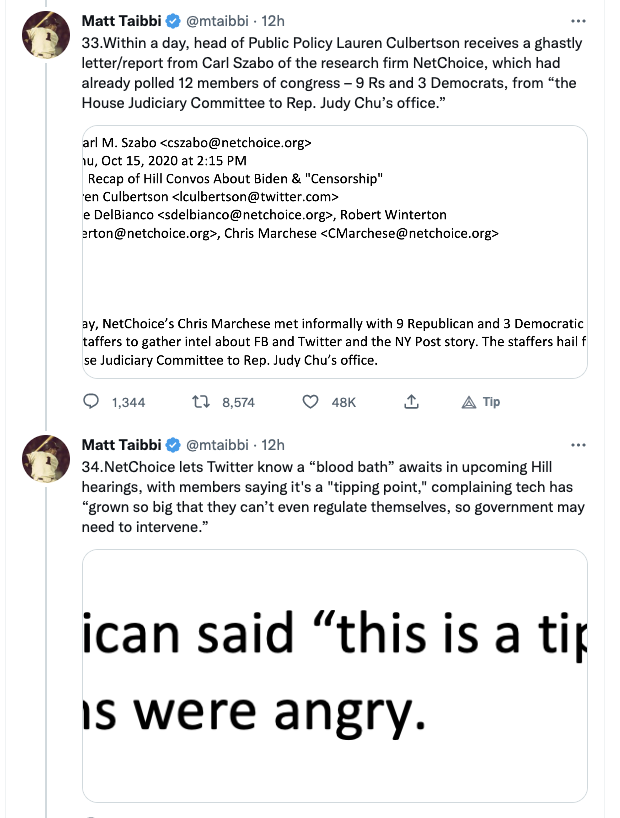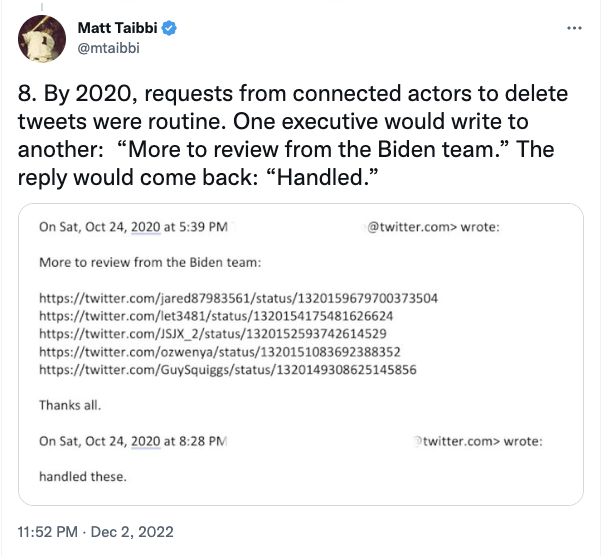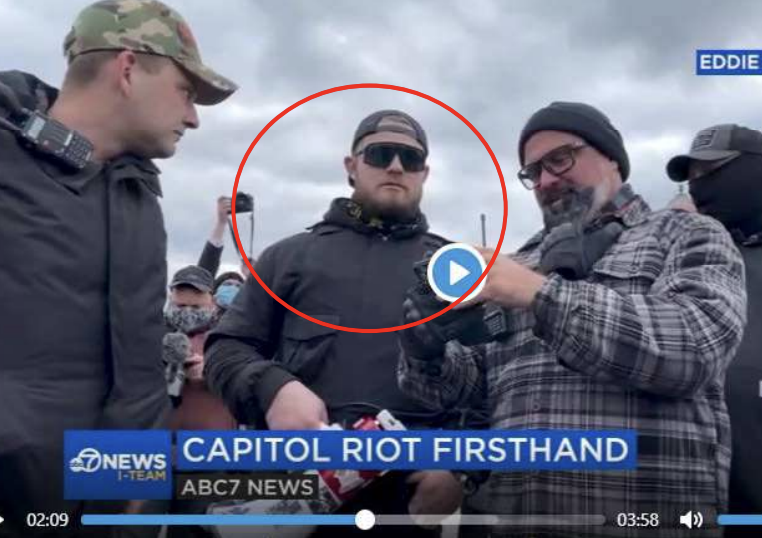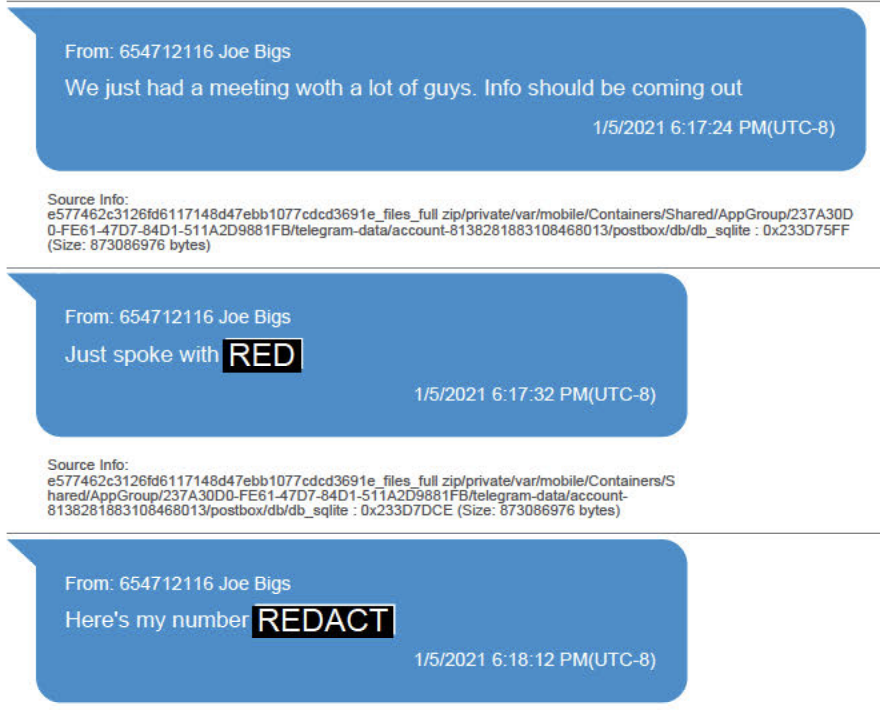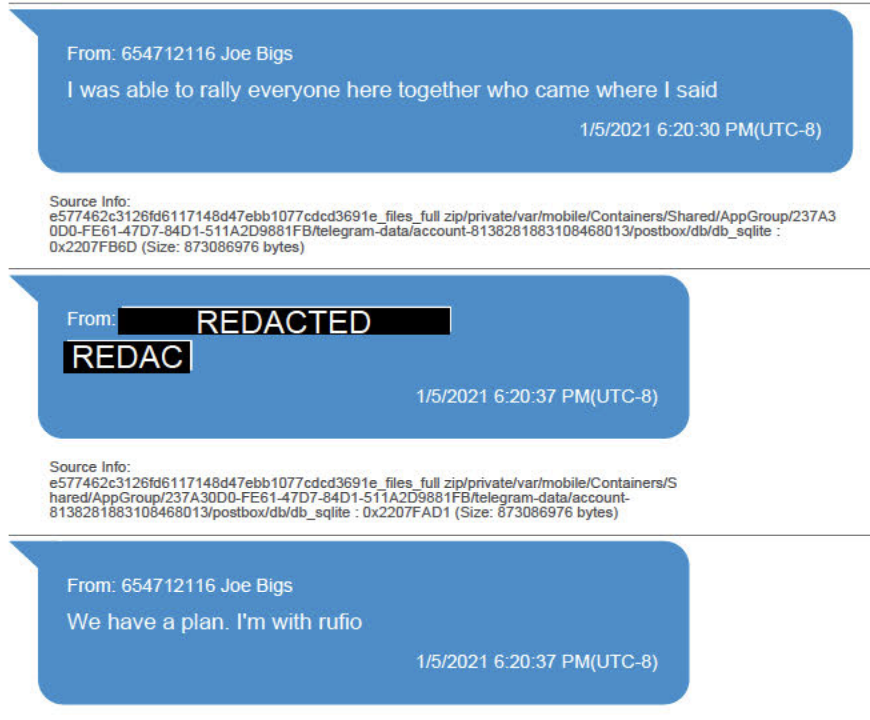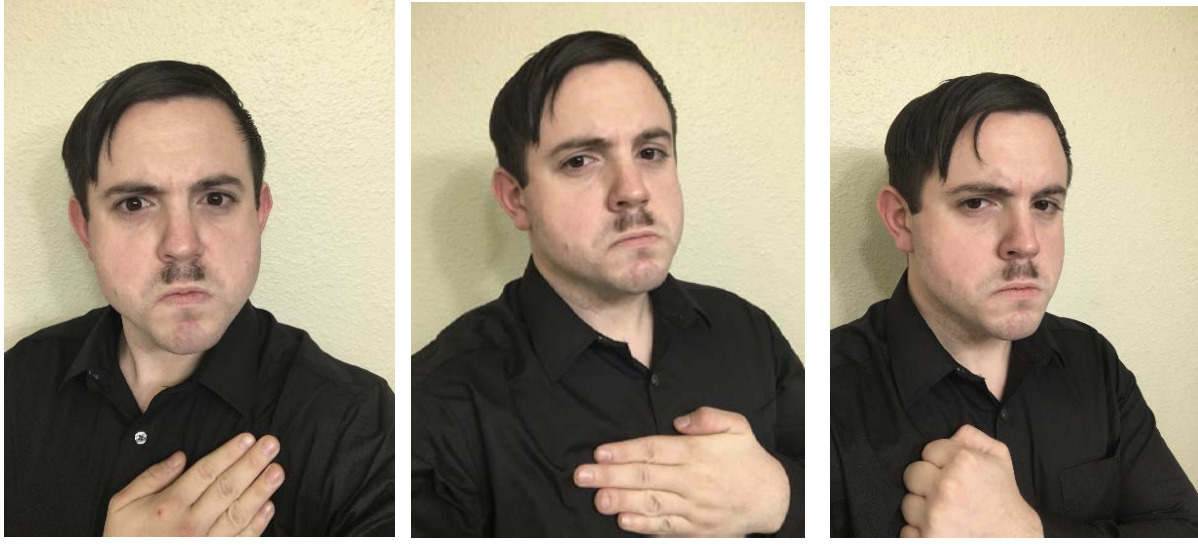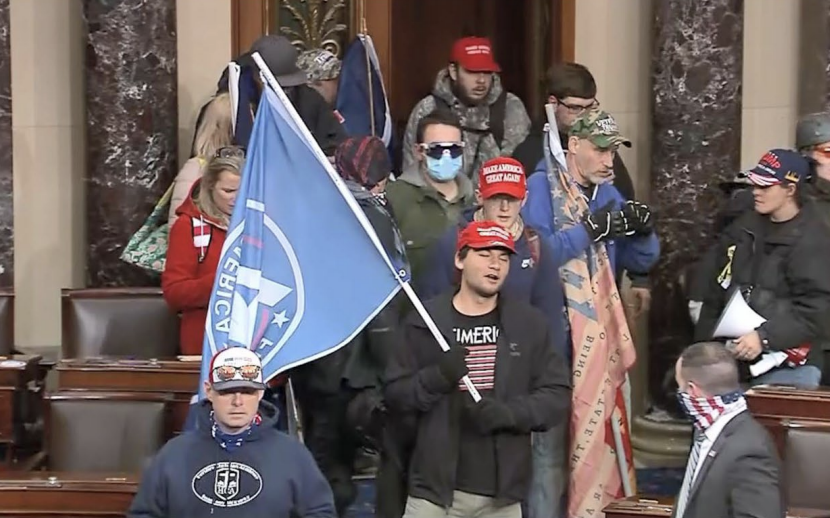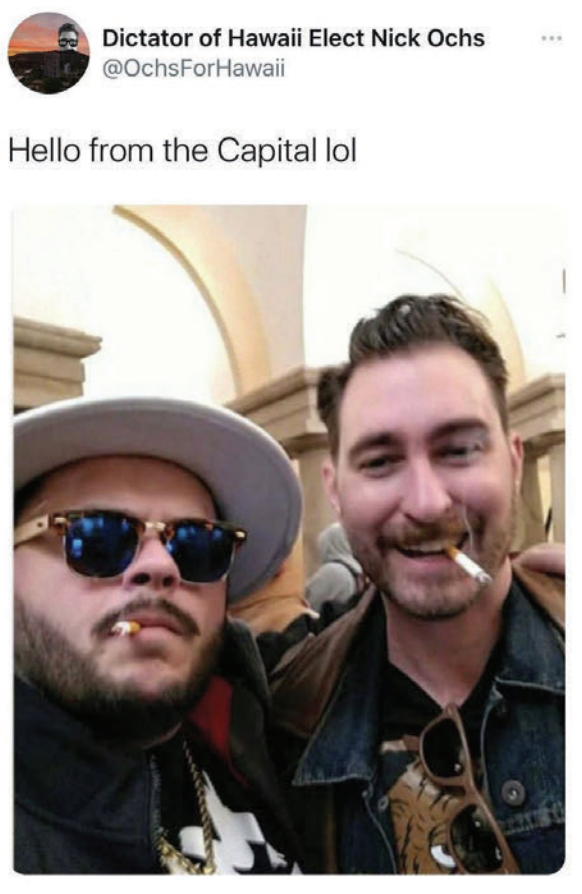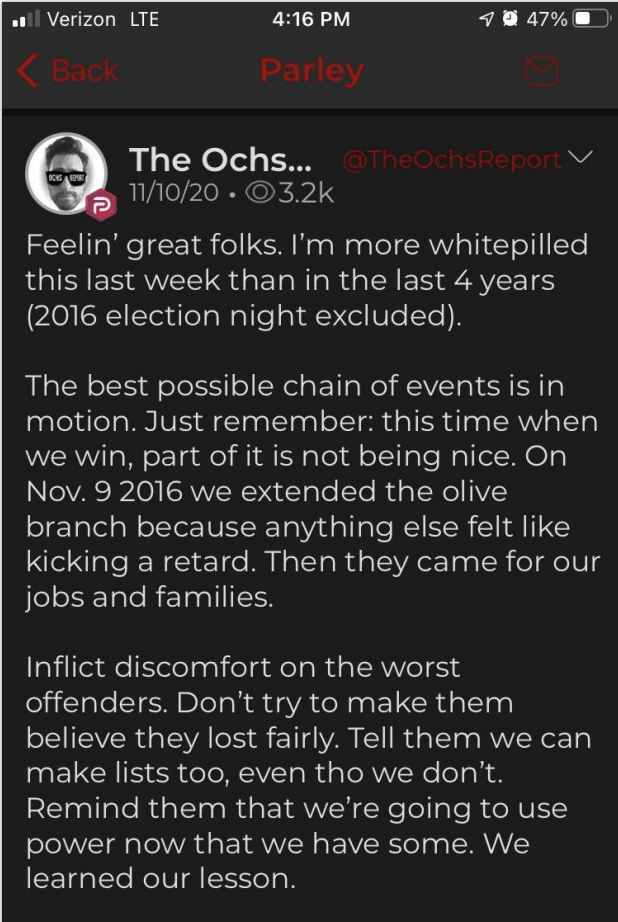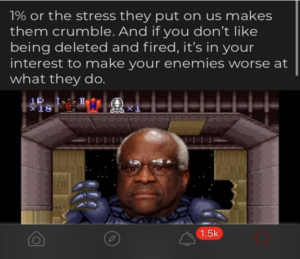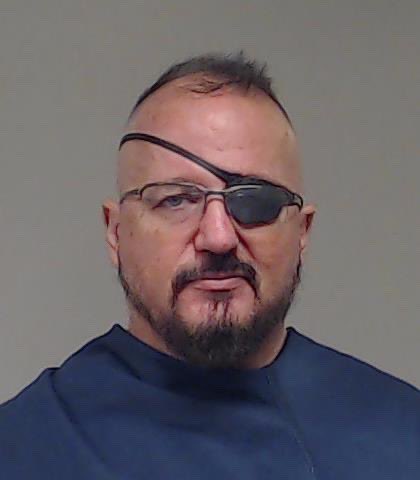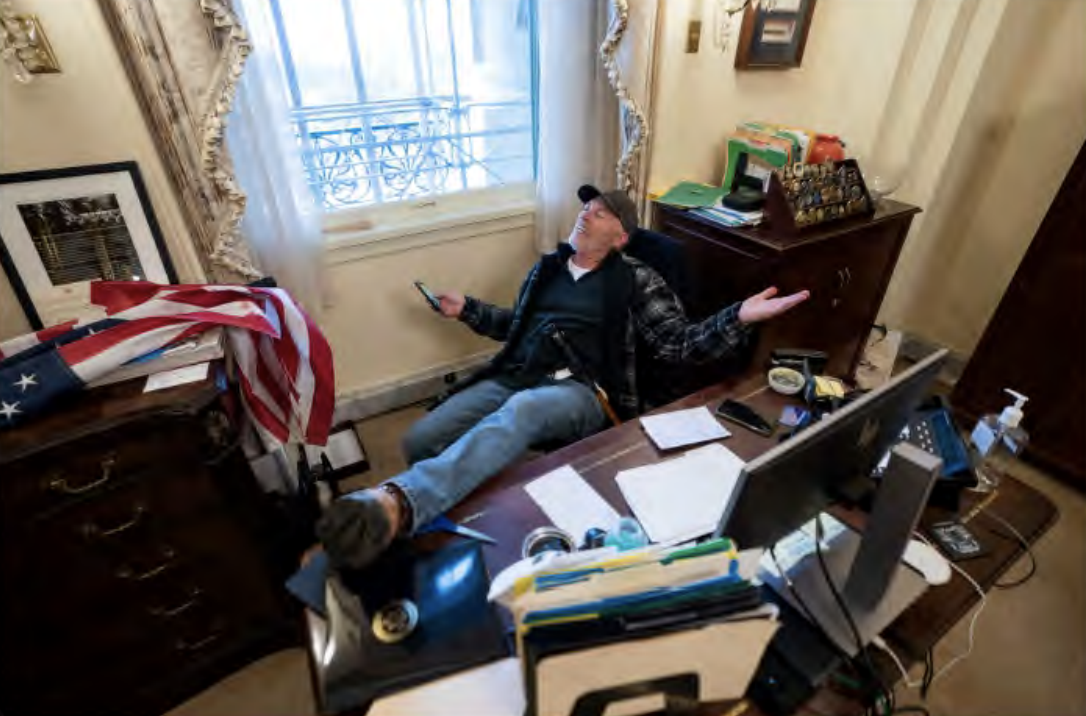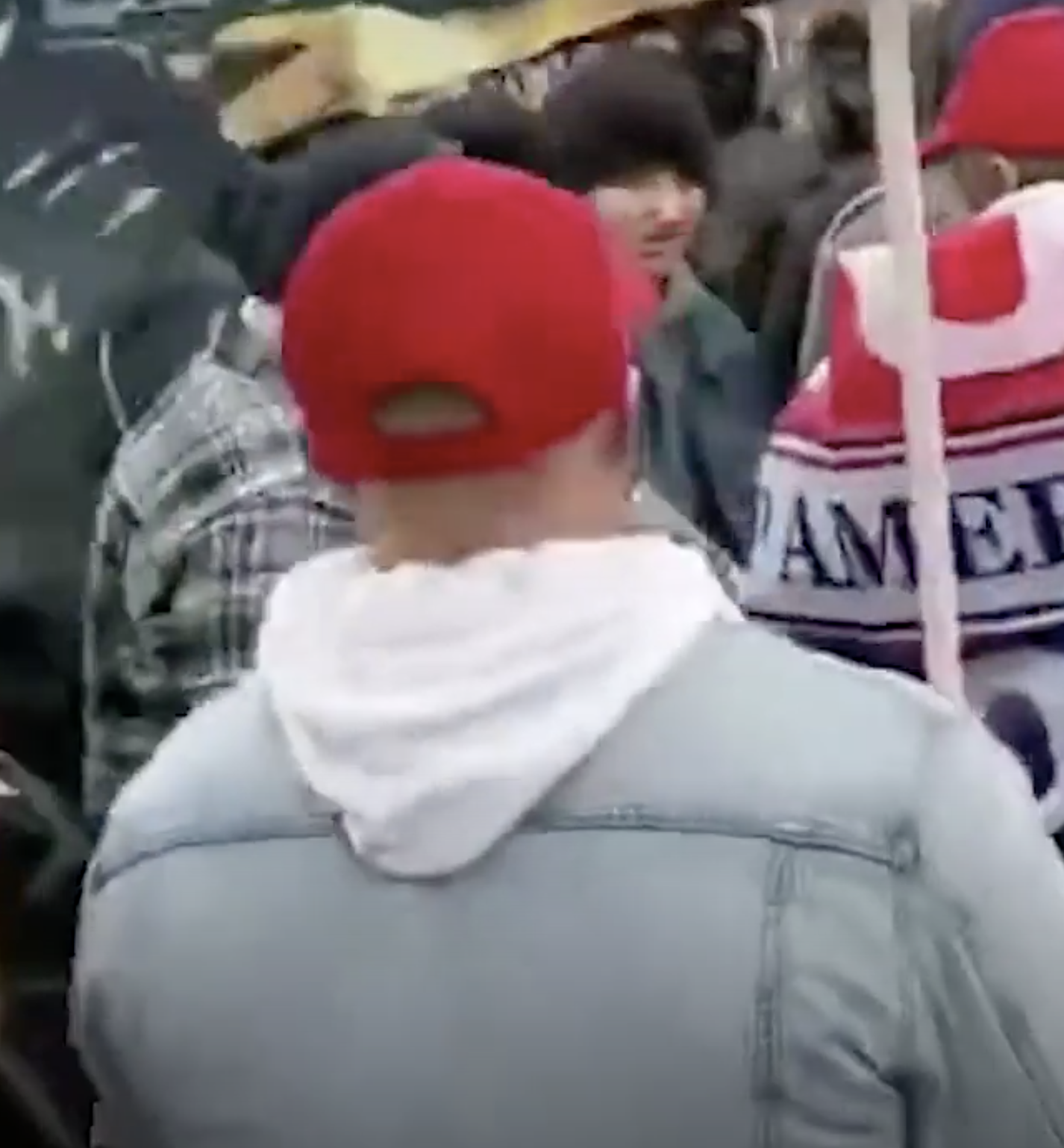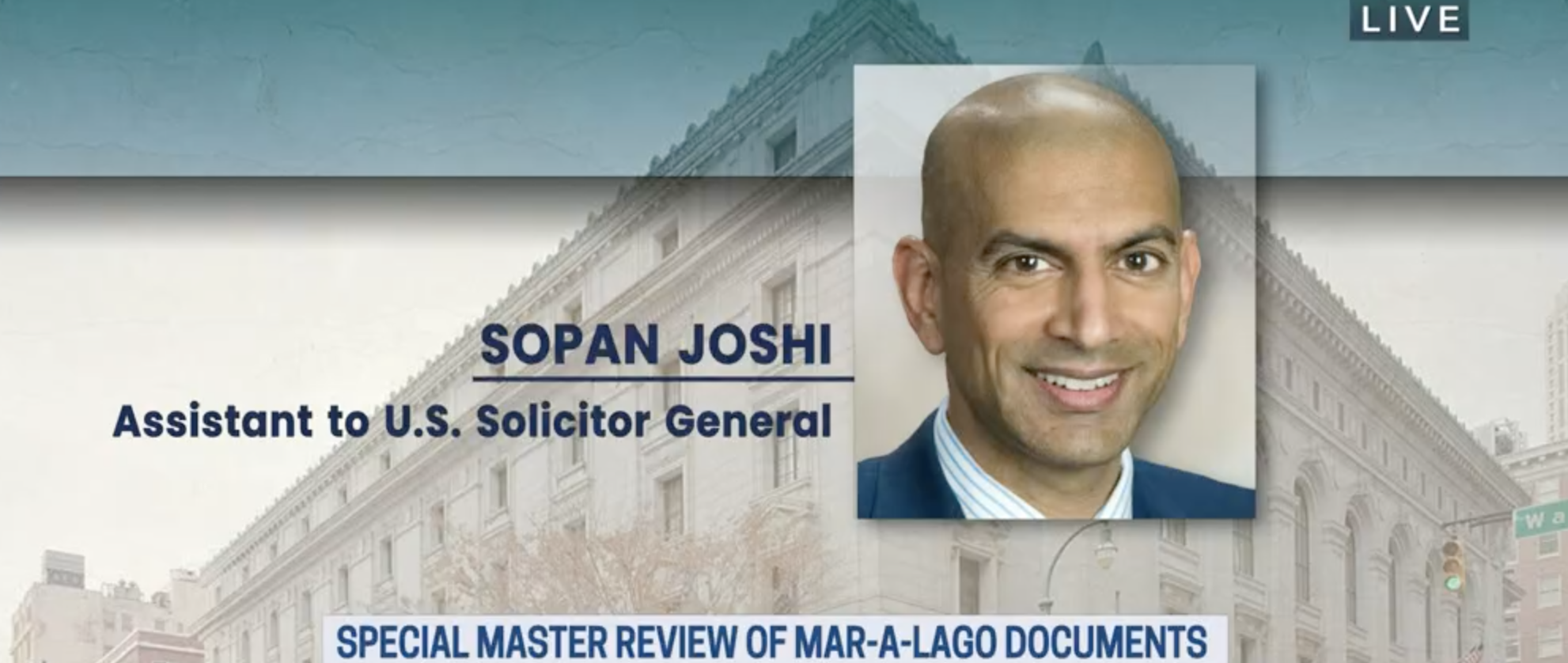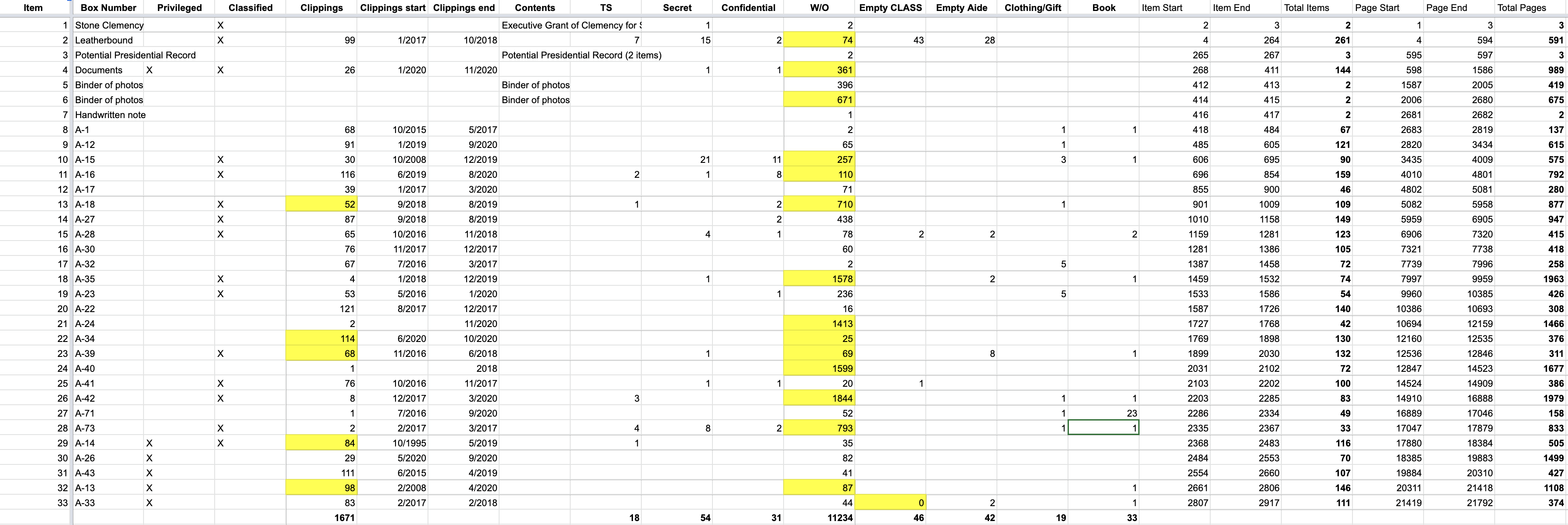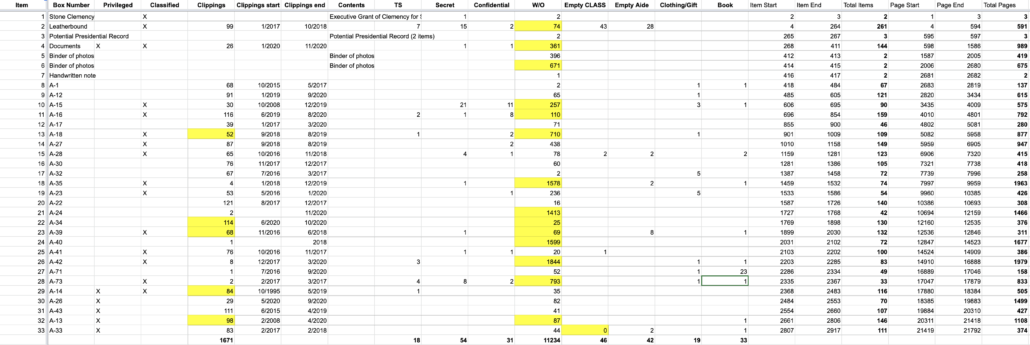Ten months ago, I wrote a post describing how the Proud Boys were a key part of the overall assault on the Capitol, because they took “normies” and made sure they were deployed to maximal advantage, including having them do the dangerous job of “smash[ing] some pigs to dust.”
The plan required six types of participants to make it work:
- People (Trump, Rudy, and Mo Brooks) to rile up large numbers of normies
- Someone (Alex Jones) to guide the normies to the Capitol, probably while communicating with the Proud Boys as they kicked off the riot
- People at the Capitol (Proud Boys and associates) to tactically deploy the normies as a weapon, both to occupy the Capitol and to create a very real risk to the members of Congress
- Members of Congress (Paul Gosar and others) willing to create conflict that could be exploited in any of a number of ways
- Masses and masses of people who, starting even before the election, had been led to believe false claims that their country was under threat; those masses did two things:
- Enter the Capitol, with a varied level of vocal enthusiasm for the mayhem occurring, and make it far more difficult for cops to put down the assault
- “Smash some pigs to dust”
Whether or not that conception is true — and just as importantly, whether DOJ can introduce the evidence to prove it at trial — has been the subject of recent pretrial litigation in the Proud Boy Leader case that may determine the outcome of the trial:
- October 7: DOJ motion in limine to admit statements (cited in and on which omnibus MIL builds)
- October 14: DOJ omnibus motion in limine including (along with a bunch of other things) admission of actions of co-conspirators and “tools” of the conspiracy, admission of defendants’ speech, limits on the questioning of Confidential Human Sources, and a two page sealed section
- October 26: Nordean opposition, including to non-defendant co-conspirators, arguing in part that that could criminalize membership in the Proud Boys
- November 4: DOJ reply,
- November 21: Biggs Supplement in response to November 18 hearing
- November 21: Nordean Supplement in response to November 18 hearing
- November 23: DOJ Supplement
As I’ve been saying for 14 months, whether this approach succeeds at the Proud Boy trial will determine the degree to which higher ranking people who were conspiring with Joe Biggs and Enrique Tarrio can be implicated in a conspiracy with those who attacked the Capitol, as opposed to an incitement or aid and abet theory of criminal exposure. And whether it succeeds is neither an easy legal question nor, for a jury assessing guilt beyond a reasonable doubt, evidentiary one.
The opening filing in this dispute argues that even if the subordinate Proud Boys and affiliates who marched on the Capitol didn’t know all the plans and objectives of the conspiracy, they were still part of it. As DOJ describes, the Proud Boy leaders, including John Stewart (Person 3), who secretly entered into a plea deal, probably in June, intentionally aimed to get lower ranking Proud Boys to obey unthinkingly.
It is important to note that it does not matter whether all these members of the conspiracy understood and “agreed on the details” of the scheme, so long as they agreed on the “essential nature of the plan.” United States v. Gatling, 96 F.3d 1511, 1518 (D.C. Cir. 1996); cf. ECF 71 at 46 (Court’s ruling on Nordean and Biggs detention, explaining that “even if someone who was a part of the conspiracy expressed surprise at the way events unfolded that day or what the ultimate outcome was . . . that does not necessarily mean there wasn’t a conspiracy of the kind alleged.”). And in fact, the evidence will show that the conspiracy’s leaders purposefully kept subordinates in the dark about the precise details, urging them to “turn off [their] brains” and “follow the . . . guys you’re with.” ECF 475 at 15 (Statements Motion, quoting statement from Person 3 to MOSD members). In assembling their group of foot soldiers, the leader defendants sought loyal followers, not co-equal partners. Cf. United States v. Mahdi, 598 F.3d 883, 891 (D.C. Cir. 2010) (finding that evidence of defendant exercising “organization control” to keep “the worker bees in line” was intrinsic evidence of conspiracy). Willing followers all, the fact that each may not have been fully privy to the entire plan in no way negates their being co-conspirators.1 Co-conspirators need not share all of the charged criminal objectives of the conspiracy, so long as they formed some agreement with the defendants. Hypothetically, if a particular member of the marching group lacked sufficient understanding of what was happening in Congress to make him part of a conspiracy to corruptly obstruct an official proceeding in violation of 18 U.S.C. § 1512, he could still be part of a conspiracy to use force to oppose the lawful transfer of Presidential power in violation of 18 U.S.C. § 2384 or a conspiracy to forcibly prevent law enforcement officers from discharging their duties in violation of 18 U.S.C. § 372. His conduct is relevant regardless. [my emphasis]
Based on that logic, the filing argues that the tactically important violence of a number of Proud Boys (plus Robert Geiswein, who is being prosecuted by Proud Boy prosecutor Erik Kenerson) was part of the conspiracy.
- Daniel Lyons Scott, aka “Milkshake,” a Proud Boy, led a crowd in shoving a line of officers to force their way up a set of steps leading to the Capitol.3
- Alan Fischer and Zachary Johnson, both Proud Boys, were part of a crowd trying to force its way through a line of officers defending an entrance to the Capitol building known as the “tunnel” on the Lower West Terrace. Johnson passed weapons up to rioters on the front line of the crowd, including a sledgehammer and a can of chemical spray.4
- Edward George, a Proud Boy, engaged in a shoving match with an officer while trying to force his way into the Capitol through the Senate Carriage Door.5
- Steven Miles, a Proud Boy, shoved and threw punches at officers in an altercation at the west front of the Capitol, and used a plank of wood resembling a two-byfour to break a window to make entry into the Capitol building.6
- Christopher Worrell, a Proud Boy, sprayed a chemical irritant while in the restricted area of the Capitol grounds.7
- Robert Gieswein, who is not a Proud Boy but who joined the marching group and wore orange masking tape as insignia showing affiliation with the marching group, sprayed officers with chemical irritant at multiple times and places inside the Capitol.8
Note, I believe all of these defendants are still awaiting trial (though Milkshake was for a time plea-curious), and thus far, only Milkshake and Worrell have been charged with conspiracy, with each other. All the rest, and their co-defendants, could well be superseded with conspiracy charges if this structure succeeds at trial.
Also of note, this government argument preceded (and to some degree explains) the leak about Proud Boy informants who had no knowledge of a plan to attack the Capitol. The defendants want to argue that if Proud Boys didn’t know of the plan to attack the Capitol, there must have been no conspiracy to do so. DOJ argues that, particularly given the hierarchy and the planned close hold on the plan imposed in advance, it doesn’t matter if they knew the overall plan and in fact the ignorance of lower level Proud Boys was actually part of the plan.
But the government is not relying just on the actions of Proud Boys and affiliates. It argues that the Proud Boys “harnessed” others who were at the attack.
Evidence of the conspiracy is not bound by the actions of the co-conspirators. As the evidence will show, on January 6, the defendants sought to harness the actions of others to achieve their objective of forcibly opposing the lawful transfer of Presidential power. In so doing, the defendants used these individuals as “tools.”
That the government is arguing this is unsurprising. As I’ve noted repeatedly, senior Proud Boys discussed doing this explicitly the morning of the attack.
UCC-1: I want to see thousands of normies burn that city to ash today
Person-2: Would be epic
UCC-1: The state is the enemy of the people
Person-2: We are the people
UCC-1: Fuck yea
Person-3: God let it happen . . . I will settle with seeing them smash some pigs to dust
Person-2: Fuck these commie traitors
Person-3 It’s going to happen. These normiecons have no adrenaline control . . . They are like a pack of wild dogs
But the two sentence paragraph, above, is all that the opening motion describes with respect to “harnessing” “normies.”
Nordean’s short response on this point notes that the government had not yet proven the bulleted list of defendants were co-conspirators, much less provided any precedent to introduce the actions of people not alleged to be co-conspirators as evidence of the conspiracy.
Even more inappropriate is the government’s attempt to show the jury countless actions by nondefendants on January 6 who the government concedes are not “co-conspirators” even under its relaxed standards. Gov’t Mot., pp. 6-7. Although the government has no evidence that these protesters joined the charged conspiracies, it says their actions are somehow admissible because they are “tools” of the conspiracy. The government cites no rule or case law holding that the criminal actions of nondefendant “tools” of a conspiracy—conceded nonmembers—can be admitted against defendants in their criminal case. There is none. The government’s novel “tools” concept has no discernable limiting principle.
This argument accompanies Nordean (and Zach Rehl’s) First Amendment argument that the poor Proud Boys were simply engaged in a non-violent protest outside the Capitol when a bunch of unaffiliated people showed up and violently attacked the Capitol.
After which the Proud Boys took credit for what those purportedly unaffiliated people had done.
(Nordean’s filing also anticipated the extended sealed argument about a bunch of informant materials that he would later claim to be surprised by.)
In reply, the government uses analogies for other types of crime. This interlocking conspiracy, DOJ argues, is like a complex drug scheme where someone might be involved in delivering the drugs but not the money laundering.
An analogy illustrates the fallacy of Nordean’s argument. Imagine a defendant charged with one count of conspiring to possess cocaine with the intent to distribute and one count of laundering the proceeds of that drug trafficking. Imagine that an uncharged co-conspirator transported narcotics on the defendant’s behalf but had no involvement in, or knowledge about, the laundering of the money. On Nordean’s reasoning, the co-conspirator’s conduct would be excluded at trial because it was only related to “a conspiracy” to traffic drugs and not “the conspiracy” to commit both object offenses. ECF 505 at 2 (emphasis Nordean’s). See Joint Proposed Jury Instructions (submitted to the Court on 11/2/2022), at 18 (“To have guilty knowledge, the defendant need not know the full extent of the conspiracy or all of the activities of all of its participants. It is not necessary for the defendant to know every other member of the conspiracy.”).
Before DOJ describes how the “normies” “harnessed” in the attack are like “money mules” in a financial transaction, it cites the discussion in advance of inciting the “normies” or leading them as the tip of a spear.
Contrary to Nordean’s telling, though, there is nothing novel about the principle that the actions of third parties can advance a conspiracy even if those parties are not full members of the conspiracy. The notion that the conspiracy could operationalize other individuals as a force multiplier is not an invention of the government; to the contrary, the conspirators expressly discussed it. See, e.g., ECF 440-1 at 20 (Transcript of MOSD meeting where Bertino explains: “[T]hey’re gonna follow us now because, you know, we’re the tip of the spear.”); ECF 111-1 at 4 (discussion on morning of January 6 about hopes that “normies burn that city to ash today” and “smash some pigs to dust,” which was “going to happen” because normies “have no adrenaline control . . . They are like a pack of wild dogs.”).
Indeed, for example, it is common for financial schemes to involve the use of “money mules” who knowingly conduct transactions at the perpetrators’ direction while remaining unwitting to the essential nature of the arrangement. See, e.g., United States v. Thomas, 999 F.3d 723, 727-28 (D.C. Cir. 2021). The conduct of those “money mules” is relevant evidence of the financial scheming defendant’s criminal intent and unlawful conduct. This case is factually different, but the basic theory is the same. The limiting principle is whether, on the evidence at trial, a jury could reasonably find a factual nexus between the actions of the conspirators and the actions of the tools. See Fed. R. Evid. 104(b) (“When the relevance of evidence depends on whether a fact exists, proof must be introduced sufficient to support a finding that the fact does exist.”). [my emphasis]
There was a hearing on all this on November 18 at which the government introduced a new angle to its argument about “harnessing” the “normies” (it was live so there was no call-in). Joe Biggs (whose lawyers are representing few other January 6 defendants, and so many not appreciate how many January 6 defendants — whether trespassers or assailants — claim they just got “caught up,” including a bunch who cited the Proud Boys as inspiration) describes the argument this way:
The Government asserted at argument that what guns were to the Oath Keepers on January 6, non-party protestors were to the Proud Boys. It further attempted to explain what it meant by this clumsy analogy when it asserted that the Proud Boys “weaponized” third parties.
[snip]
Perhaps mindful of the difficulties its arguments presented, the Government asserted that the defendants had “weaponized” third parties, either fellow members of the Proud Boys, members of other groups, or so-called “normies” unaffilated with any group, to engage in acts of violence. The Government did not argue just how percipient agents were transformed into little more than zombies, or tools, at the disposal of the defendants.
[snip]
The analogy to “mules” in narcotics cases in unavailing. In the case of passive mules, that is a party unknowingly carrying a prohibited item from one location to another, the mule lacks knowledge and intent to commit a crime. They are used as a transportation device. They are agents acting on purposes all their own but used by others to accomplish unlawful aims The Government is unclear whether it seriously intends to argue that protestors on January 6, 2021, were used without their knowledge, forced, somehow, to carry on as foreign objects the ideas of another. One suspects the Government cannot mean this, otherwise why would they prosecute the nearly 1,000 individuals charged with crimes requiring intent?
Nordean, whose lawyers do represent a slew of other defendants (though usually those who had more culpability themselves), responds this way.
[T]he government proposes to show the jury the criminal actions of individuals on January 6 who are (a) nondefendants, (b) not members of the charged conspiracies, (c) not members of the Proud Boys, and (d) not linked to the Defendants through a recognized principle of liability such as conspiracy, aiding and abetting, solicitation, or “willfully causing an act to be done.” ECF No. 494, pp. 3-7. The government describes the relevance of such evidence as follows: “the ‘tools’ of the conspiracy [were] deployed by the defendants in furtherance of their criminal objectives.” Id., p. 3 (emphasis added). “These ‘tools’ served as instruments of the defendants to carry out their criminal objective. While unwitting to the criminal objective, they were employed to take action on behalf of and in furtherance of the criminal objective.” Id. (emphasis added). According to the government, this group includes all “normies” whom the Defendants “sought to ‘let [] loose’ on January 6.” Id. Although the government does not say it in plain English, its “tools” argument aims to show the jury any and all criminal acts by any actor on January 6 on the contradictory relevance theory that these Defendants caused all of those acts and yet, at the same time, are not “criminally liable” for any of them. ECF No. 494, p. 7.
In the November 18 hearing, the Court indicated that the “tools” evidence might satisfy the test of relevance even if the government could not establish that the Defendants are legally responsible for the “tools’” actions under a recognized theory of liability.2 The Court suggested that relevance may lie in the following argument: the government alleges that the Defendants conspired to use “normies” to further their conspiratorial aims and thus the “jury should be permitted to see” what Defendants “achieved by mobilizing the crowd.” ECF No. 494, p. 4.
However, embedded in the government’s argument is a factual premise failing which the test of relevance cannot be satisfied. Whether acts of violence on January 6 by “normies” were caused or “mobilized” by the Defendants is a fact question. If those acts were not caused by the Defendants’ “mobilization,” they are not relevant under the government’s novel argument. A counterfactual shows this to be the case. Suppose Normies 1-4 rushed past barriers, ran into the Capitol, and assaulted police officers. They have never heard of the Proud Boys, nor did they see or hear the Defendants on January 6. Displaying their actions to the jury cannot demonstrate the “manner and means of the defendants’ conspiracy,” ECF No. 494, p. 3, as there is no causal relationship to speak of.
In response, the government will try to contend that even absent any causal relationship between the Defendants’ actions and those of “normies,” the latter are relevant inasmuch as the Defendants allegedly dreamed of being or aspired to be an instigator of the normies on January 6. But while Defendants’ alleged pre-January 6 comments about riling up the normies may in that case still hold relevance as to the nature/scope of the alleged criminal agreement, the actions of the normies themselves would not be relevant. Absent any causal relationship between the Defendants’ actions and the normies’ criminal acts, the latter can logically show neither that the conspiracy “succeeded” nor that the Defendants’ alleged agreement somehow “planned” the normies’ actions even where unilaterally undertaken without knowledge of Defendants’ desires.
[snip]
Here, the government has adduced no evidence to show that the actions of the “normies” or other nondefendants were caused by the Defendants’ actions. ECF No. 494, pp. 3-7. None exists. The government has not adduced the statement of any “normie” or other nondefendant to the effect that their acts were “caused” by the Defendants. [my emphasis]
The bolded language may be the only place in the papers where the Proud Boy defendants address the repeated explicit reference in their Telegram threads to riling up “the normies.” But Nordean gets at a critical issue: The government has proof that the Proud Boys intended to “harness” the “normies.” He’s arguing they don’t have proof, perhaps in the form of witness testimony, that hundreds of other January 6 defendants did what they did because of actions of the Proud Boys. (If pressed, the government could come up with at least a dozen witnesses who did talk about following the Proud Boys, but I trust from Nordean’s claim that they haven’t committed to doing so, and one subtext of this fight is the aborted effort by DOJ to get Ryan Samsel to enter a cooperation agreement in which he would testify about what Biggs told him before Samsel set off the entire attack.)
The government, partly because Nordean is also challenging the reliance on earlier evidence and events at the two earlier MAGA Marches, describes first how the Proud Boy Leaders cultivated a certain kind of recruit leading up to the attack, using comms to show senior Proud Boy leaders picked members who had embraced violence to be part of MOSD and anticipated needing a lot of bail money.
The escalation of both violence and violent rhetoric among the Proud Boys from November through January is not only highly probative to the charged conspiracy, it cannot be separated therefrom. After the Ministry of Self Defense was approved as a chapter, the defendants in leadership set about hand-selecting other individuals to join the group. In deciding who to admit, the defendants drew on their knowledge and experience with them at prior rallies. The fact that some of the recruits came into the chat and nearly immediately made references to violence, without rebuke by Nordean or any other leader, is additional evidence both (1) why they were chosen for MOSD, and (2) what they had come to understand about MOSD’s purpose based on their prior communications with the defendants and other leaders of the conspiracy.4 See Ex. 3 (proposed trial exhibits comprising messages from MOSD recruits upon joining group, expressing (1) willingness to “log into Minecraft”; (2) shared experience of previous “seek and destroy” mission in DC “where we had a target which was Black Lives Matter plaza”; (3) expectation that members were going to need “a lot of bail money”; (4) understanding that “protest time” means “punch ‘em in the face”; and (5) appreciation that “to be in this group, you need to . . . be able to fucking kick ass if you need to kick the fuck ass.”).
It responds to the complaints about the government’s theory of “riling the normies” by pointing to specific moments when the Proud Boys opened the way through which hordes would swarm.
To be clear, the government does not plan to argue that every member of the crowd on January 6 was a tool of the defendants’ conspiracy. The tools will consist primarily of those Proud Boys members and affiliates whom the defendants recruited and led to the Capitol as part of their marching group. As the government explained, many of these individuals would also qualify as co-conspirators who shared a criminal objective with the defendants (even if, as far as the followers understood, that objective was only to commit assault). See 11/18/22 Tr. at 66 (“[W]e would argue, first, that these people are co-conspirators.”); 119 (“[P]art of what the tools theory does is says, even if these people were just signed up to commit violence without knowing why or against whom it would be directed, that’s still relevant.”). In some other instances, of course, the tools will be apparent strangers whose conduct nonetheless has a causal relationship with the defendants. For example, video evidence at trial will show that numerous rioters surged toward the Capitol as a result of Nordean, Biggs, and others destroying a black metal fence that was obstructing the crowds’ progress. Video will likewise show that many rioters entered the Capitol through a window that Pezzola smashed. All these facts lend credence to Tarrio’s own evaluation of the causal relationship at work: “Make no mistake, we did this.”
Stated thusly, it is a more modest argument than the government could have made and may one day make. There’s no reference to Alex Jones delivering the mob created by Donald Trump to his allies (and former employee, in the case of Biggs) in the Proud Boys, for example. Instead, the government seems to be looking barrier by barrier to show that the Proud Boys created the breach through which thousands ran.
I’ve been expecting an argument like this for months. But I admit it’s a close legal call.
I keep thinking about two things as I read this: First, a chilling line in cooperating witness Matthew Greene’s statement of offense, where he likened the moment on January 6 when things turned from peaceful to violent to his time in Afghanistan.
Greene noticed that during and following the chanting, the mood in the crowd changed, and it reminded him of his time in Afghanistan while stationed there with the U.S. Army, when protests changed from peaceful to violent.
While I don’t know the military experiences of Joe Biggs or other Proud Boy veterans, what Greene was describing was the Proud Boys deliberately stoking an insurgency the likes of which many of the men present (both Proud Boys and others) had fought in Iraq and Afghanistan. Some of these guys know how to incite an insurgency because they fought them for so long overseas.
The other thing that’s not clear is who DOJ will have as witnesses. I don’t think Pezzola’s lawyers have submitted an active filing for weeks or months, a possible sign Pezzola is close to or has already flipped; given that he literally breached the Capitol, making way for everyone else, if he were a cooperating witness at trial it would be far easier to make this argument. And while the very first filing in this series described Aaron Whallon-Wolkind (Person 2) as part of the core conspiracy…
Specifically, the jury will be called upon to evaluate whether the defendants and their co-conspirators – including Enrique Tarrio, Joseph Biggs, Ethan Nordean, Zachary Rehl, Charles Donohoe, Jeremy Bertino, Persons 2 and 3, and Dominic Pezzola – entered into an agreement to accomplish an unlawful objective. The defendant’s own words, and those of their co-conspirators, reveal (1) their motive to stop the lawful transfer of power; (2) their agreement to use force to do so, including against law enforcement and elected officials; (3) their efforts to recruit individuals to carry out the criminal objective of the conspiracy; 1 and (4) their efforts to encourage other individuals present on January 6 to use force to achieve their objective.
… unlike Bertino (who formally pled guilty the day before this filing) and John “Blackbeard” Stewart (Person 3), who pled guilty in June, it’s unclear what AWW’s status is. That’s important because he was part of the plan to, “see thousands of normies burn that city to ash” on January 6.
The status of Ron Loehrke, another former Marine who played a key role in directing the attention of the rioters, is also unclear. A year ago, he was arrested on civil disorder and trespassing charges — but not obstruction or conspiracy — with co-defendant Jimmy Haffner (Haffner was also charged with a tactically important assault, at the East Door), but AUSA Kenerson has gotten three pre-indictment continuances of their case, through January 10, probably right in the middle of the Proud Boy Leader trial.
In other words, DOJ’s arguments about the way the Proud Boys deployed “normies” to carry out the bulk of the attack on the Capitol make a ton of sense given the evidence from the attack. This approach also helps to explain a lot of the oddities and apparent delays about the larger Proud Boy prosecution.
What’s unclear is whether DOJ will succeed in introducing it as evidence at trial.

